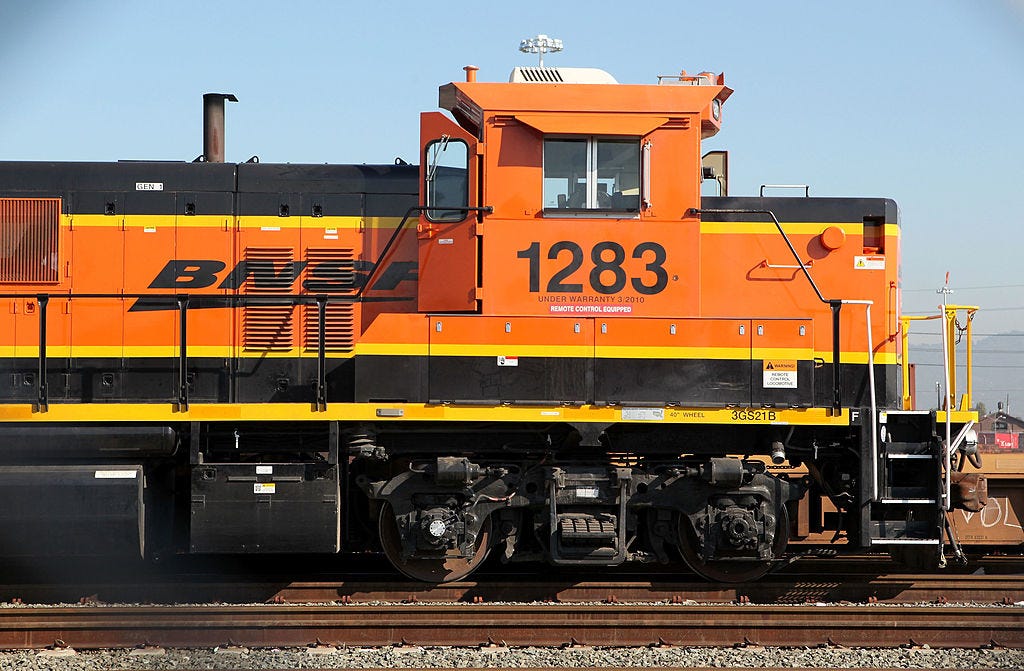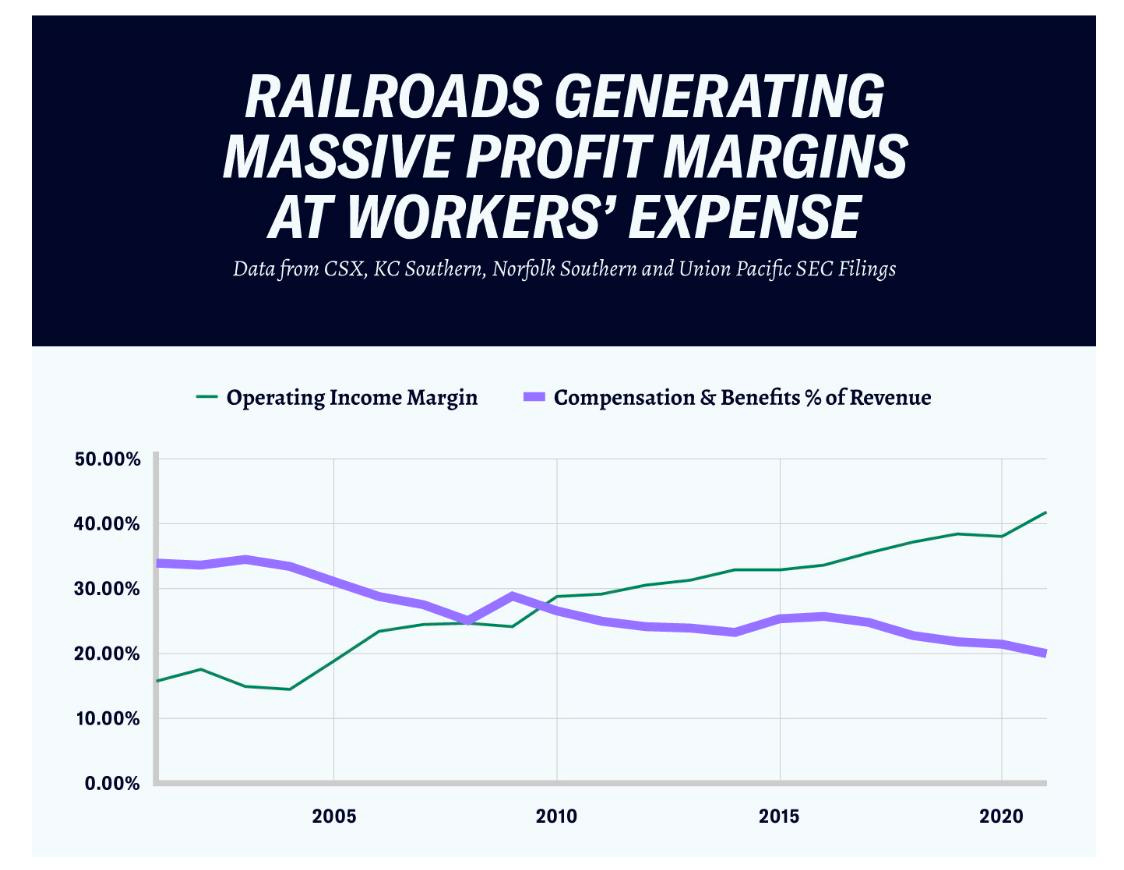Railroading workers
Railroad workers across the country are threatening to go on strike on December 9, delivering a potentially crippling blow to the American economy. According to the Association of American Railroads, a nationwide rail shutdown could cost more than $2 billion per day. There are 140,000 miles of rail in the United States, which are operated by about 115,000 rail workers. This network serves "nearly every agricultural, industrial, wholesale, retail and resource-based sector of our economy." Passenger rail would also stop, disrupting hundreds of thousands of commuters.
The dispute boils down to one issue: paid sick leave.
Rail workers and railroad companies are at an impasse after more than two years of negotiations. In July, Biden named a Presidential Emergency Board (PEB) in an effort to help resolve the dispute and avoid a strike. The PEB issued recommendations that formed the basis of a tentative agreement in September between the railroad companies and 12 unions. The deal did not include any paid sick leave.
The tentative agreement was subject to ratification by the members of the rail unions. And a majority of workers at four of the 12 unions rejected the deal. The unions that voted against the deal represent 60,000 rail workers, including the largest rail union, SMART Transportation Division. And the 12 unions have agreed to honor each other's picket lines. That sets up the possibility of a strike beginning on December 9, when a "cooling off" period expires.
The tentative agreement did secure significant pay increases for rail workers, raising wages by about 24% over 5 years. The unions, however, note that the increase does not even keep up with the pace of inflation. But wages don't appear to be the primary sticking point.
Railroad companies have adamantly refused to include any short-term paid leave. That means rail workers must report to work, even when they are sick, or forfeit their pay. "It’s an insane and cruel system, and these guys are fed up with it," Peter Kennedy, chief negotiator for the maintenance workers union, which rejected the deal, said. Rail workers say that some colleagues come to work with COVID because they can't afford to take time off. The maintenance workers are seeking a deal with at least four paid sick days. The railroad companies, according to the union, are unwilling to negotiate.
Rail workers have demanding jobs, often requiring them to be on the road for weeks at a time. Further, over the last six years, "major railroads have reduced their work forces by nearly one-third," increasing the workloads for workers that remain.
On Monday, a coalition of hundreds of business groups, organized by the U.S. Chamber of Commerce, wrote to Congressional leaders and demanded they pass legislation prohibiting rail workers from striking.
As provided for under federal law and consistent with past practice, Congress must be prepared to intervene before the end of the current “status quo” period on December 9 to ensure continued rail service should railroads and four unions fail to reach a voluntary agreement. A strike by any one union would assuredly result in a stoppage of national rail service.
But the corporate trade organizations that signed the letter helped create the current crisis.
Among 22 highly-developed nations, the United States is the only one that does not require employers to provide paid sick leave. Spain requires 16 days of paid sick leave, Belgium provides at least one month, and the UK guarantees at least 28 weeks. For more than a decade, members of Congress have introduced legislation, the Healthy Families Act, that would require all businesses with at least 15 employees to provide seven paid sick days each year. If the Healthy Families Act were law, there would probably not be a looming strike because the railroad companies would be legally required to provide paid sick leave.
The Healthy Families Act has not passed Congress "largely because corporate lobbyists mounted a fierce effort to block it." In 2014, a column by staffers for the Employment Policies Institute, a corporate front group, asserted that "paid sick leave is a cure worse than the disease." A permanent paid sick leave requirement was initially included in one of the coronavirus relief bills, but it was removed at the insistence of business groups and Republican lawmakers.
Congress could avert a rail strike by passing the Healthy Families Act. Instead, corporate lobbyists are demanding that Congress prevent rail workers from securing paid sick leave through collective bargaining.
In a statement released Monday evening, Biden urged Congress to give the railroad companies and corporate lobbyists what they want.
I am calling on Congress to pass legislation immediately to adopt the Tentative Agreement between railroad workers and operators – without any modifications or delay – to avert a potentially crippling national rail shutdown.
…As a proud pro-labor President, I am reluctant to override the ratification procedures and the views of those who voted against the agreement. But in this case – where the economic impact of a shutdown would hurt millions of other working people and families – I believe Congress must use its powers to adopt this deal.
Congress has a variety of options. One possibility would be to impose a modified agreement that includes paid sick days. The railroad companies could certainly afford it.
The railroad industry's record profits
Providing 15 days of paid sick leave would cost the industry roughly $688 million per year, according to the rail companies. But with railroad profit margins at record highs, this cost would hardly harm profitability.
BNSF, one of the largest railroad freight carriers, saw its net income climb four percent to $4.5 billion in the first nine months of this year. Last year, the railway raked in $6 billion in profits, a 16% jump from the year prior.
Its parent company, Warren Buffett’s Berkshire Hathaway, also spent at least $32 billion since last year buying back stock. This tactic, which was considered a form of market manipulation until 1982, drives up stock prices by reducing the number of shares in the market. Company executives who derive most of their compensation from stocks have every incentive to invest corporate profits towards buybacks instead of workers.
Last week, Buffett added $1.38 billion to his net worth in a single day after Berkshire Hathaway closed at a high price – that’s twice as much money as it would cost to fund 15 days of paid sick leave for every rail worker in the country. Buffett's BNSF is notorious for penalizing workers for taking time off for “fatigue, family emergencies or illness.” Workers at the railway also say they’re expected to be on call 90% of the time, including throughout the night.
Similarly, Union Pacific, the largest railroad in the U.S., said it had its “most profitable year ever in 2021,” reporting $6.5 billion in profits. More recently, the railway posted a net income of $5.4 billion for the first nine months of the year, an 11% increase from a year ago. Compared to 2000, the railway today employs 18,000 fewer workers but makes 85% more in revenue. Since 2021, the company has also spent nearly $13 billion repurchasing its own stock – enriching Union Pacific executives at the expense of their workers.
CSX also reported a 15% increase in net earnings last quarter. The railway’s net income for the first nine months of the year reached $3.1 billion. It also reported spending $3.7 billion so far this year repurchasing shares. Norfolk Southern made a record $3 billion in income in 2021, a 27% increase from 2020. In the first nine months of 2022, the railway has surpassed where it was during the same time in 2021, increasing its net income to $2.5 billion.
Meanwhile, as profits soar, some of the largest U.S. railroads have also significantly slashed their spending on labor over the years.
“In 2001, the four railroads spent about $8.7 billion on compensation and benefits to generate $25.6 billion. In 2021 the companies spent 10% more on labor but brought in nearly double the amount of revenue,” More Perfect Union reports.




Share buybacks should be capped at minimum and probably be made illegal. They only enrich the C-suite and the shareholder class. It's grotesque.
"CRX profits up 15%, spent 3.7 BILLION on stock buybacks" and resists granting sick leave to workers that they work like dogs? Like no one can see what's wrong with this picture. I didn't realize that sick leave was at the heart of the conflict until reading this article. Not because I haven't been paying attention, quite the contrary. One more example of how poorly news is reported.
Thanks again Judd. You and your crew are making a real difference sir!!!